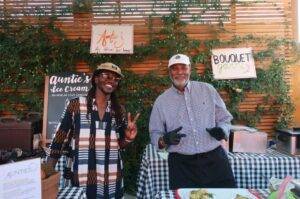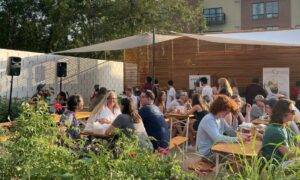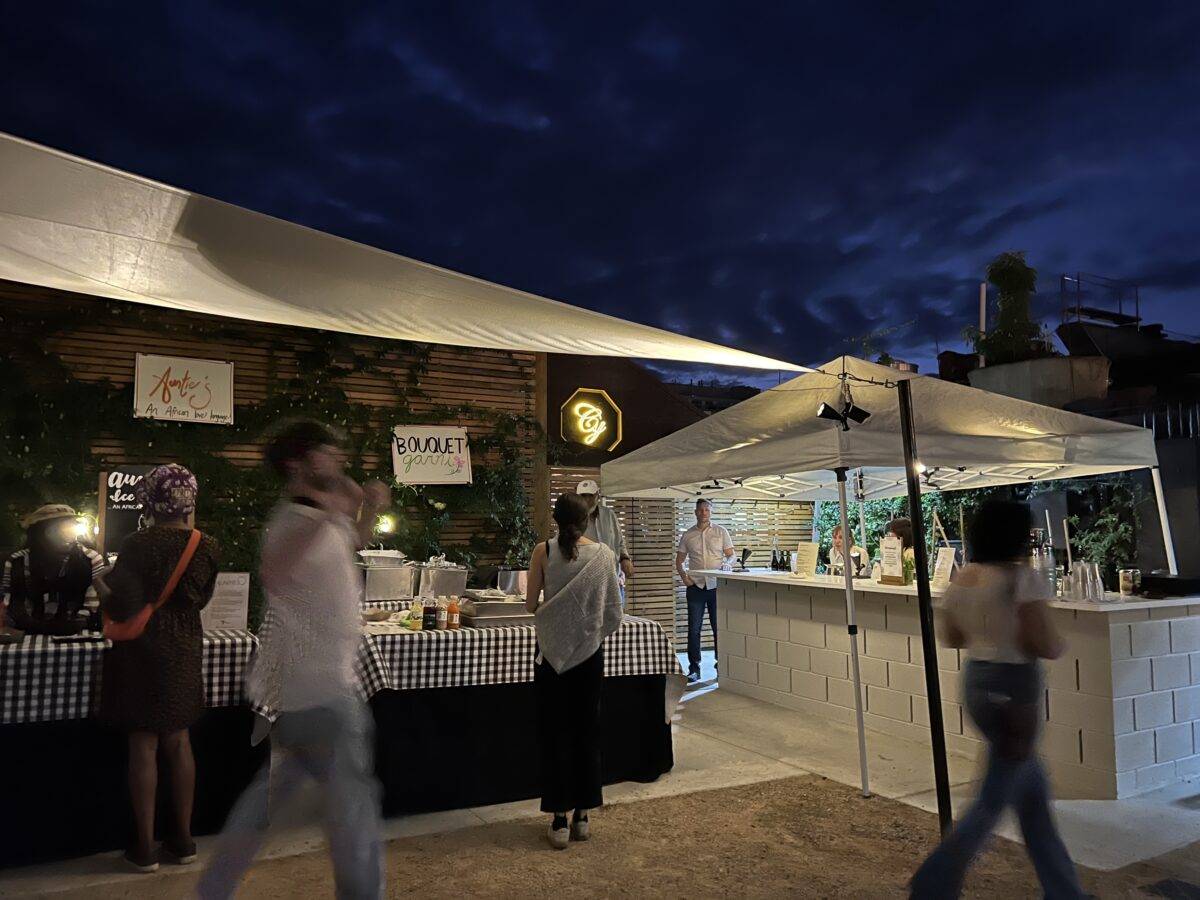I recently had the pleasure of sitting down with Andrea Reusing, owner of and chef at Lantern, and Abby Parcell, program coordinator for Garden Spot, a pop up event space for aspiring food start ups in Lantern’s backyard. The current series concludes this weekend on Friday and Saturday night 5-8pm, just off the alley behind Lantern (421 W. Franklin Street).
Vendors include:
Bouquet Garni: Eric Ndiaye
Senegalese small plates & sweets
Mr Gravy’s: Zim Torain
BBQ ribs, waffle fries and fruity lemonades
King’s Pepper: Gail Jennings
West African tacos: black-eyed pea fritter, topped with crunchy veg and Shango sauce (v)
Simone’s – A Real Jamaican Joint: Kisha & Earl Munroe
Curry goat, oxtail, and jerk chicken, peas & rice
Wye Hill Brewing – a rare chance to experience Wye Hill outside their restaurant. Luminous Beings Hazy IPA; Flower, Sun and Rain Petite Saison; A Green Million Miles; Dead End Tracks, and Sun for Miles Hefeweizen
MUSIC: Hiding Places (Friday) and XOXOK (Saturday).
In a wide ranging conversation, we discussed the motivation behind Garden Spot, a changing Franklin Street, supporting small farms, hot peppers, and bathroom lighting, among other topics. Part 1 of our conversation, edited for brevity and clarity, is below. Stay tuned for Part 2 soon.
How did the idea for Garden Spot come about?
In 2020, Lantern bought the building that’s long been its home base and gained control of a small parking lot behind the restaurant. That created an opportunity for Lantern to reimagine the space:
Andrea: We all loved parking right behind the restaurant but once we were able to buy the lot it just seemed like a bad use of the space. Since we opened Lantern in 2002, we’ve all struggled with the fact that our friends couldn’t also find ways to open businesses downtown. The notion of “Franklin Street” and what that means is different for everyone. The people who feel welcome on Franklin Street are well, the people you see on Franklin Street. We wanted to be able to have a conversation about that. Obviously, representation on Franklin Street and downtown can’t be addressed with pop ups, but we wanted to find a way to talk to other business owners and our larger community.
Abby: The idea was, how do you use this in a better way than just a parking lot? How can it bring people downtown? What are the possibilities for private/public kind of opportunities? I think about how difficult it is to get a food business up and running. Also being aware of connections to [local] food systems. How do you bring all those different pieces of the community together? Is there something that we can do in that space?

The Town also had some pandemic recovery funds available, and they were looking for unique ways to support small business owners, and in particular people of color and others that maybe had been disadvantaged by the system. The basic idea is: a place where we can hold events and pop ups, music and food and all those things and showcase small food businesses, particularly from Durham and Orange County, but also beyond. And whether that’s somebody that has never done a pop up before and they’re trying to find out what it would really look like to run a food business or somebody that is testing a new product and wants to try things out with a new market, or, or someone that’s trying to make the leap beyond their successful food truck or farmers market stall and wants to test out what it would mean to do something more permanent or bigger.
There’s no vendor or rental fee. We require that vendors have a business license, prepare the food in an inspected kitchen and have ServSafe certification. As needed, we provide last-step prep space and storage, marketing, connections to our advisory group, and a peer network of people who are participating. So that’s another thing that we really want to support is relationships among the vendors and newer applicants. We also have a partnership with the Durham Tech Small Business Center [to assist applicants with business planning if needed].
Stephen: What is the right stage for someone to be for it to be valuable to be able to participate? It’s not someone who’s just making pies in their home kitchen. They’re a step beyond that, but not brick and mortar?
Abby: Right, or they might not have a food truck. We’ve got folks that have been selling at the farmers market, but don’t have their own food trucks. That kind of thing. Maybe people who have been catering from a commissary but don’t have brick and mortar. And I think that person that’s making pies at home, we would say come to our network gatherings, meet people who have moved from that [stage] to this next one and maybe they can help you figure out how to move to that next spot.
Why is something like Garden Spot needed?
Abby: Startups are hard. There are a lot of barriers to entry, access to capital, or getting promotional support. [We’re] trying to get people connected to the resources that already exist in the community, like the community college system or the Piedmont Food Processing Center–so they might have more support to take the next step. By hosting only 4-6 vendors at a time,we support relationship building and that social capital that can really smooth things out in a lot of different ways. How do you increase access and connections? It’s also wanting to try to help make downtown a place that is more welcoming to lots of different people and neighborhoods and communities.
On a changing Chapel Hill and the rise of Durham
Andrea: When I moved here 30 years ago, it was a weird, fun place where on any given night you could go out and meet somebody that would change your life or at least your opinion. It’s harder now to have an experience that you could only have in Chapel Hill. It feels like we’re close to a point of no return, that we’re becoming so calcified and homogenous that there are fewer realistic options going forward.
We did this hotel in Durham with a rooftop bar and were lucky to be able to host some of the most diverse crowds I’ve ever been a part of- race, identity, age, experience. Everyone in this kind of crowd is like, “why is this something we can only experience on a certain night of the week at a certain bar?” Something we all hear all the time is “why is everybody going to Durham?” People are not going to Durham just because there’s more culture and cool food happening there. They’re going to have an experience of being in the real world and not in a kind of fabricated monoculture.
Stephen: When I moved here [in 2002], people would still warn you “don’t live in Durham” for what I think are obvious reasons [i.e., racism]. And then Durham blew up. And Raleigh. And I think that it caught Chapel Hill off guard. I think Chapel Hill always thought we are the cool college town.
Andrea: Definitely. Jesse Helms wanted to put a fence around Chapel Hill, not Durham.
Abby: It’s another missing middle. I think that’s where the housing conversation figures into all of it. We’re missing housing– and [also things like] outdoor venues that draw that people density.
Stephen: I think that we’ve become a town where we’ve got the college students, and that’s great. We’ve got the retirees, and they’re going to be many, many more of those coming here. And that’s great. And in between, you’ve got families with children who will often make sacrifices so their kids can be in the schools here, right? A lot of people here I feel are pretty tethered to their children, and it’s hard to go out. You have to get a babysitter.
Andrea: We need more DINKs! [dual income, no kids households]
Stephen: Yes, and young professionals. We produce them here and then they move to Raleigh or Charlotte or DC.
Andrea: Or New York. I think that was a big sadness of my 20s, we just lost friends all the time. People come here to go to school, but it’s hard to retain them. And now when people move back to NC they go to Durham or Pittsboro.
Stephen: I’ve had people ask me about moving here. If they don’t have kids, I don’t think I would recommend that. It’s too socially isolating.
Why are we attracting so many chain restaurants?
Andrea: With the churn and burn of chain restaurants in Chapel Hill, people always point to rents and greedy landlords. I think the main factor is actually density. In a town of our size, it’s hard for any independent business–the kind of places that both attract visitors and support downtown residents–to do the volume we need to create any sort of real, sustainable annual profit.
Chapel Hill punches above our weight in the national consciousness but given that so many of us are students, we’re commercially pretty small. We think that because we are nationally known that we’re somehow OK. But really we’re collapsing under the weight of our own “Chapel Hill” snobbery because we’re not figuring out ways to direct and manage this growing population in a way that is going to preserve the energy and appeal of the town.
On preserving Chapel Hill (or not)
Stephen: It’s funny, you use that word [preserve] because the preserve Chapel Hill crowd doesn’t want anything to change. So you’re an advocate for a changing downtown?
Andrea: People who talk about “preserving Chapel Hill” don’t have a realistic idea about what our downtown needs to survive. Downtown has been treated as an amenity for people in our surrounding neighborhoods and corporate UNC. Some blocks of Franklin Street feel like Southpoint now and this has been seen as a big win until recently.
Nationally, the downtowns that thrive are the ones that embrace the whole life of their communities. Where people of all incomes and experiences can live their lives, walk to school, walk to church, see music, connect with friends they run into on the street.
What’s most important about Chapel Hill are the people who live here, the people who have struggled here and and the people who have created lives here. When only a certain kind of person can live here, we aren’t really a town at all.

Stephen: I feel like the town, when it’s talking about improving downtown or Franklin Street, I feel like they’re often listening to people who don’t really come downtown. Or they maybe they come once every couple of months. But really, they’re driving around the suburbs. I feel like we’re getting advice from the wrong people about how to build a vibrant downtown.
Abby: And that’s the holy grail of local government – figuring out how you actually hear from the folks whose lives could be made a lot better. People who don’t have time to say “this is what I need that would make it better.”
Andrea: If you mainly drive downtown at 7:00pm on Saturday nights and worry a lot about parking, you are also probably someone who has good access to town surveys. Survey responses shouldn’t be used for decision making unless they can reflect and prove true representation of our community.
Stephen: In addition, I think there are a lot of people who don’t even live here, they can’t afford to live here, so they’re not even on the radar as potential Chapel Hillians [to offer advice to the town].
Andrea: Agreed. Most entrepreneurs who have expressed interest in Garden Spot don’t live in Chapel Hill, though almost all would like to open a business here.
Housing and commutes of Lantern staff
Stephen: Where do Lantern staff live? Tell me about their commutes and their housing. And what effect does it have on them and your business?
Andrea: It’s a real mix. The bulk of our team lives in Carrboro and walk or bike to work. Many are students who live on campus or in off campus housing. Some are in Durham, Burlington or Pittsboro and have very long commutes. Of the Chapel Hill residents who work at Lantern, I think that almost all are living here with support from parents or friends.
One of the best things about being in business for so long is realizing how many of us at Lantern have been able to buy homes here, close to where we work. But it’s no longer a common thing and when it happens now it usually means a 45 minute commute.

